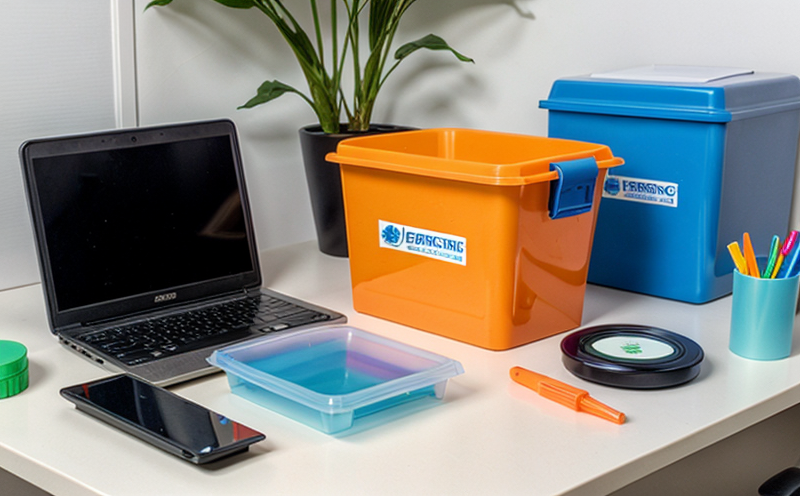ISO 175 Chemical Resistance Testing of Office Plastics
The ISO 175 Chemical Resistance Test is a critical process used to evaluate the durability and performance of plastics in contact with chemical substances. This test ensures that office stationery products, such as pens, rulers, erasers, and other materials, maintain their integrity when exposed to common chemicals found in office environments.
The ISO 175 standard specifies the procedure for determining the resistance of a plastic material to immersion in a defined liquid at controlled temperature. This test is essential for quality managers, compliance officers, R&D engineers, and procurement teams who need to ensure that their products meet stringent international standards.
During this testing process, specimens are immersed in various chemical solvents under specified conditions. The aim is to observe any changes or degradation in the material's properties such as color, texture, or mechanical strength. This ensures that office stationery plastics not only function effectively but also remain safe for use over extended periods.
The test can help identify potential weaknesses in material selection and design choices early on in product development cycles. By simulating real-world conditions through rigorous testing procedures, manufacturers can improve the lifespan and reliability of their products.
For instance, when designing a new type of eraser or pen, ISO 175 chemical resistance testing ensures that these items won't deteriorate quickly due to exposure to common chemicals like water-based ink, solvents used in cleaning supplies, or even simple hand oils from frequent handling. Such tests play an important role in maintaining product quality and ensuring customer satisfaction.
Let's delve deeper into the specifics of this testing method:
- Material selection: Specimens must be representative of the final product, including any additives or fillers that might affect chemical resistance.
- Testing conditions: The temperature and duration of immersion are critical factors. Typically, specimens are immersed in a solution at room temperature for 24 hours or more depending on the specific requirements outlined by ISO standards.
Understanding these parameters helps manufacturers make informed decisions about material composition and processing methods early in their design stages.
The results of this test can significantly influence product development strategies. For example, if a particular type of plastic shows signs of degradation after exposure to a common solvent, adjustments may be made to the formulation or manufacturing process to enhance chemical resistance.
ISO 175 chemical resistance testing is just one aspect of ensuring high-quality office stationery plastics. Other tests might include impact strength, tensile properties, and flame retardancy depending on the specific application requirements.
Scope and Methodology
| Aspect | Description |
|---|---|
| Test Specimens | The specimens used in ISO 175 testing are typically small pieces cut from the bulk material. These samples should be representative of the final product. |
| Liquid Media | The liquid media chosen for immersion must accurately reflect real-world conditions. Common solvents include water, alcohols, and ketones. |
| Temperature Control | The temperature of the testing environment is crucial as it affects how chemicals interact with the material. |
| Duration | The length of time specimens are immersed determines the extent to which chemical reactions occur. Longer durations can provide more accurate results but also require careful monitoring to prevent excessive degradation. |
The procedure involves immersing these specimens in different types of liquids at specific temperatures and times. Afterward, the samples are examined for any signs of deterioration or change. This includes visual inspection as well as quantitative measurements like weight loss or changes in dimensions.
Eurolab Advantages
EuroLab offers unparalleled expertise in conducting ISO 175 chemical resistance tests on office stationery plastics. Our state-of-the-art facilities equipped with advanced instrumentation allow us to provide precise and reliable results every time.
- Accurate Results: Using the latest technology, our labs ensure that all measurements are accurate and repeatable.
- Comprehensive Testing: We offer a full range of services including mechanical testing, thermal analysis, and more besides chemical resistance tests.
EuroLab's experienced team stays updated with the latest industry trends and regulatory changes. Our commitment to maintaining high standards means you can trust us for all your testing needs.
Quality and Reliability Assurance
- Standard Compliance: EuroLab adheres strictly to international standards such as ISO 175, ensuring that our tests meet the highest quality benchmarks.
- Consistent Results: Our rigorous quality control measures ensure consistent outcomes across multiple batches of samples.
We employ strict protocols and use calibrated equipment to guarantee accurate results. This consistency is crucial for maintaining product reliability and ensuring compliance with relevant regulations.





